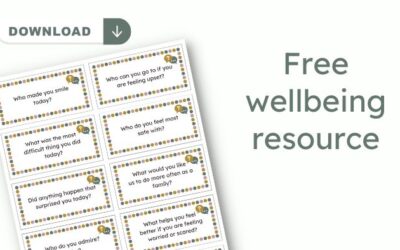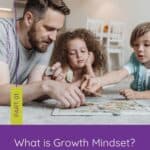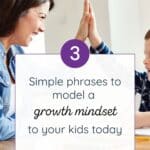“Ugh, I can’t do this. This is too difficult. I give up!”
Have you ever caught yourself saying something like that? I certainly have—and I’m a tutor! How we talk to ourselves can have a real impact on our potential.
In this new monthly series, I’ll be sharing short and snappy, easy-to-digest posts all about growth mindset and how you can bring it into your home. I hope this series will help your children develop confidence, curiosity and resilience in their learning (and far beyond). And it starts with us—the grown-ups in their lives.
Affiliate Disclosure: This post may contain affiliate links. This means that I may receive a small commision – at no cost to you – if you make a purchase through these links. Thank you for your support!
What is a Growth Mindset?
The term ‘growth mindset’ was coined by psychologist Carol Dweck. It describes the belief that abilities can grow with effort, practice and learning. It’s the opposite of a fixed mindset, where someone believes their abilities are just “how they are” and can’t be changed.
Despite what some may think, we all have a mix of both—especially in different or challenging situations. There’s a distinct difference between what these mindsets sound like…
Fixed mindset thinking sounds like:
“I’m just not good at maths.”
“She’s naturally clever.”
“I can’t draw.”
Growth mindset thinking sounds like:
“I can’t do this… yet.”
“Mistakes help me learn.”
“I can train my brain like I can train my muscles.”
What Mindset Messages Are You Sending at Home?
You know that as parents, your words and actions matter. Children are like sponges who easily pick up more from what we do than what we say. If they hear and see us giving up easily or putting ourselves down, chances are, they will copy that thinking.
On the other hand, if your kids see you learning from mistakes, tackling challenges enthusiastically and showing a love for learning new things – that’s the good stuff. It would be great for them to absorb that!
Walk the walk and talk the talk!
Take the Mindset Quiz!
So, what kind of mindset do you think you have? Do you tend to have more of a fixed or growth outlook? Is there room for improvement?
Take my quick 5-question quiz to help you discover. No judgement, just a bit of fun and a sprinkling of insight! No personal details are needed.
What You Can Say and Do to Model a Growth Mindset
Over the next couple of weeks, be mindful of how you respond to events and challenges to help you reflect on your own mindset.
Here are a few ways you can model a growth mindset at home:
- Talk about your own challenges and what helped you overcome them
- Say things like “This is tricky—but I’m learning” or “Let’s figure it out together”
- Praise effort, not outcome: “You worked hard on that” vs “You’re so smart”
- Reframe mistakes: “Oops—what can we learn from that?”
- You don’t have to be perfect. Just being open minded and willing to make small changes is enough to make a difference.
What’s Next?
Next month, in the second post in this growth mindset series, I’ll show you some simple ways to start introducing mindset ideas to your child, with simple phrases, examples and a printable activity.
Book: Carol S. Dweck (2016). Mindset: The New Psychology of Success. Random House [Available from Amazon here]
Website: Growth Mindset vs. Fixed Mindset: What's the Difference? - Harvard Business School Online













0 Comments